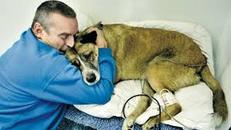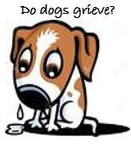Tragic, Sudden, Unexpected:
Grieving for Traumatic Pet Loss
Grieving for Traumatic Pet Loss
www.psychologytoday.com
(Brilliant website - do find the time to visit!)
(Brilliant website - do find the time to visit!)
There are times when life just isn't fair. things happen that are unfair, unexpected and incredibly painful. When we open our hearts and our homes to our four legged (and three legged) family members, our pets and animal companions, we hope for a full and healthy life for all of us.
At times, we don’t get that opportunity. Experiencing the death of a pet that is unexpected, sudden, or tragic can leave a profound impact on us as grieving animal lovers. Many times we can place unjust guilt and blame upon ourselves for the experience.
This article explores an overview in order to cope with this experience. Grief isn’t easy when it is expected and can be even harder when it is unexpected. If you’ve just experienced the death of your companion please visit Four Steps to Take After Experiencing Pet Loss, first.
At times, we don’t get that opportunity. Experiencing the death of a pet that is unexpected, sudden, or tragic can leave a profound impact on us as grieving animal lovers. Many times we can place unjust guilt and blame upon ourselves for the experience.
This article explores an overview in order to cope with this experience. Grief isn’t easy when it is expected and can be even harder when it is unexpected. If you’ve just experienced the death of your companion please visit Four Steps to Take After Experiencing Pet Loss, first.
Incomplete Endings
A common “buzzword” within the grief support world is “finding closure” and that complicated grief arises with incomplete grief experiences. Many times I challenge that notion as there are many occasions that pet owners cannot experience “closure” before experiencing the death of a pet. At times, pets get hit by cars and don’t make it through that experience. Other times, as pets are biologically programmed to hide their pain, we discover a disease process too late and blame ourselves for not seeing it earlier.
Within the grief process, our brains are attempting to make sense of the experience. We are attempting to believe that things happen for a reason… even if that reason is to place blame on ourselves for not seeing something earlier. Unfortunately, we can only do the best with what we know, and we cannot know that something is “wrong” or that our pet may have had a disease when no symptoms were shown.
When a pet escapes from our home and something happens it is very important to remember that we didn’t plan for that to happen. We didn’t get up that morning and say “I’m going to leave the gate open and my dog is going to get out” or “I’m going to forget to lock the doggy door and let my indoor cat escape.”
There are times when life just isn’t fair. Things happen that are unfair, unexpected, and incredibly painful. When we open our hearts and our homes to our four legged (and three legged) family members, our pets and animal companions, we hope for a full and healthy life for all of us.
At times, we don’t get that opportunity. Experiencing the death of a pet that is unexpected, sudden, or tragic can leave a profound impact on us as grieving animal lovers. Many times we can place unjust guilt and blame upon ourselves for the experience.
This article explores an overview in order to cope with this experience. Grief isn’t easy when it is expected and can be even harder when it is unexpected. If you’ve just experienced the death of your companion please visit Four Steps to Take After Experiencing Pet Loss, first.
Guilting” All Over Ourselves
Guilt is a powerful emotion that impacts our lives consciously and unconsciously. Guilt can make us punish ourselves and affects our ability to feel positive. Throughout the grief process, especially when associated with having to make a sudden euthanasia decision, grieving pet owners place massive amounts of guilt upon themselves.
Our brain cycles through never-ending “what-if” scenarios such as, “did I make the right decision?” or “what if I had just another day with my pet?” and even, “I should have noticed that mass or slight limp sooner.”
Guilt commonly leads to increased feelings of anxiety and even panic when we place the blame for the experience upon ourselves. The important thing to remember is to allow ourselves to process through our emotion in a healthy way.
It can be easy to cycle quickly out of control when our emotions are placing more and more pressure upon ourselves. We can easily feel completely burdened, overwhelmed, and unable to meet our daily needs throughout our grief process. We feel as though we don’t deserve to experience happiness, joy, and sometimes even comfort throughout this time. We avoid experiences, people, or places that might impact that negative cycle or distract us from it.
If you feel this cycle happening to you, it can be helpful to ask ourselves, “what would my pet want for me?” Meaning, would your pet want you to suffer and place blame, or would they be understanding with you? Would they want for your happiness regardless of what happened?
I would so say, without hesitation. That’s just who are pets are.
A common “buzzword” within the grief support world is “finding closure” and that complicated grief arises with incomplete grief experiences. Many times I challenge that notion as there are many occasions that pet owners cannot experience “closure” before experiencing the death of a pet. At times, pets get hit by cars and don’t make it through that experience. Other times, as pets are biologically programmed to hide their pain, we discover a disease process too late and blame ourselves for not seeing it earlier.
Within the grief process, our brains are attempting to make sense of the experience. We are attempting to believe that things happen for a reason… even if that reason is to place blame on ourselves for not seeing something earlier. Unfortunately, we can only do the best with what we know, and we cannot know that something is “wrong” or that our pet may have had a disease when no symptoms were shown.
When a pet escapes from our home and something happens it is very important to remember that we didn’t plan for that to happen. We didn’t get up that morning and say “I’m going to leave the gate open and my dog is going to get out” or “I’m going to forget to lock the doggy door and let my indoor cat escape.”
There are times when life just isn’t fair. Things happen that are unfair, unexpected, and incredibly painful. When we open our hearts and our homes to our four legged (and three legged) family members, our pets and animal companions, we hope for a full and healthy life for all of us.
At times, we don’t get that opportunity. Experiencing the death of a pet that is unexpected, sudden, or tragic can leave a profound impact on us as grieving animal lovers. Many times we can place unjust guilt and blame upon ourselves for the experience.
This article explores an overview in order to cope with this experience. Grief isn’t easy when it is expected and can be even harder when it is unexpected. If you’ve just experienced the death of your companion please visit Four Steps to Take After Experiencing Pet Loss, first.
Guilting” All Over Ourselves
Guilt is a powerful emotion that impacts our lives consciously and unconsciously. Guilt can make us punish ourselves and affects our ability to feel positive. Throughout the grief process, especially when associated with having to make a sudden euthanasia decision, grieving pet owners place massive amounts of guilt upon themselves.
Our brain cycles through never-ending “what-if” scenarios such as, “did I make the right decision?” or “what if I had just another day with my pet?” and even, “I should have noticed that mass or slight limp sooner.”
Guilt commonly leads to increased feelings of anxiety and even panic when we place the blame for the experience upon ourselves. The important thing to remember is to allow ourselves to process through our emotion in a healthy way.
It can be easy to cycle quickly out of control when our emotions are placing more and more pressure upon ourselves. We can easily feel completely burdened, overwhelmed, and unable to meet our daily needs throughout our grief process. We feel as though we don’t deserve to experience happiness, joy, and sometimes even comfort throughout this time. We avoid experiences, people, or places that might impact that negative cycle or distract us from it.
If you feel this cycle happening to you, it can be helpful to ask ourselves, “what would my pet want for me?” Meaning, would your pet want you to suffer and place blame, or would they be understanding with you? Would they want for your happiness regardless of what happened?
I would so say, without hesitation. That’s just who are pets are.

ealthy Distraction (Even When You Don’t Want To)
When it comes to complicated grief, our lives are severely impacted in a negative fashion. Individuals can barely focus on daily activities and tasks, let alone meeting basic needs and maintaining relationships. We are stuck in a ruminative, or repeating, cycle that burdens us further and further into our grief experience and the associated pain.
Please remember it is completely normal in the natural process of grief to experience many of these symptoms in the beginning, especially when it comes to experiencing or walking into the sudden death of your pet. We can lose our appetite, isolate ourselves, and cry uncontrollably. As it’s discussed in 9 Myths About Pet Loss And What The Truth Really Is, those feelings of grief are natural and should be expressed.
Throughout the grief process it is important to experience healthy distractions, even while actively grieving. A healthy distraction could be as simple as a walk through the park, making sure to notice the flowers blooming. It may be a close, understanding friend taking us out for coffee and laughing about something small, even for a brief moment. It may be a time when you’re journaling that you remember fond memories of your pet and smile for the experience that was shared.
These distractions are all very positive and allow us for a moment of respite from our burdening experience of grief. Grieving is hard work and very taxing on the body, but it is also crucial to experience. In the face of unexpected grief and death, it is all-consuming and very real, especially when it comes to the death of our pet.
Taking It One Moment At A Time
If you take no other advice from this article, remember that grief is a moment-to-moment process. It can be too hard to ask for even a day at a time, as a day can seem endless when we are in the midst of our grief.
Remember that in this moment and with every emotion our body is processing through its grief. It can be very hard to take care of ourselves during our experience in pet loss, even painful, but it’s important to try.
When it comes to complicated grief, our lives are severely impacted in a negative fashion. Individuals can barely focus on daily activities and tasks, let alone meeting basic needs and maintaining relationships. We are stuck in a ruminative, or repeating, cycle that burdens us further and further into our grief experience and the associated pain.
Please remember it is completely normal in the natural process of grief to experience many of these symptoms in the beginning, especially when it comes to experiencing or walking into the sudden death of your pet. We can lose our appetite, isolate ourselves, and cry uncontrollably. As it’s discussed in 9 Myths About Pet Loss And What The Truth Really Is, those feelings of grief are natural and should be expressed.
Throughout the grief process it is important to experience healthy distractions, even while actively grieving. A healthy distraction could be as simple as a walk through the park, making sure to notice the flowers blooming. It may be a close, understanding friend taking us out for coffee and laughing about something small, even for a brief moment. It may be a time when you’re journaling that you remember fond memories of your pet and smile for the experience that was shared.
These distractions are all very positive and allow us for a moment of respite from our burdening experience of grief. Grieving is hard work and very taxing on the body, but it is also crucial to experience. In the face of unexpected grief and death, it is all-consuming and very real, especially when it comes to the death of our pet.
Taking It One Moment At A Time
If you take no other advice from this article, remember that grief is a moment-to-moment process. It can be too hard to ask for even a day at a time, as a day can seem endless when we are in the midst of our grief.
Remember that in this moment and with every emotion our body is processing through its grief. It can be very hard to take care of ourselves during our experience in pet loss, even painful, but it’s important to try.

when we are in the midst of our grief.
Remember that in this moment and with every emotion our body is processing through its grief. It can be very hard to take care of ourselves during our experience in pet loss, even painful, but it’s important to try.
If feelings of suicide emerge and you begin to feel unsafe, please know there is always help available and people that care at the National Suicide Hotline at 1-800-273-8255. There are online communities and support in the least likely of places. Note from FOTD - In SA you can contact Suicide.org
Remember that in this moment and with every emotion our body is processing through its grief. It can be very hard to take care of ourselves during our experience in pet loss, even painful, but it’s important to try.
If feelings of suicide emerge and you begin to feel unsafe, please know there is always help available and people that care at the National Suicide Hotline at 1-800-273-8255. There are online communities and support in the least likely of places. Note from FOTD - In SA you can contact Suicide.org
|
For many dogs, the highlight of their day is a game of fetch with the ball. Who can resist? You’d have to have a heart like a stone to say no. Or, like me, to know too much.
|
Are Essential Oils good for our dogs, and if so which one's should we use?
|
What many people find hard to believe is that animals can form very firm attachments with each other. Even pets that outwardly seem to barely get along will exhibit intense stress reactions when separated. In fact, grieving pets can show many symptoms identical to those experienced by the bereaved pet owner.
|






